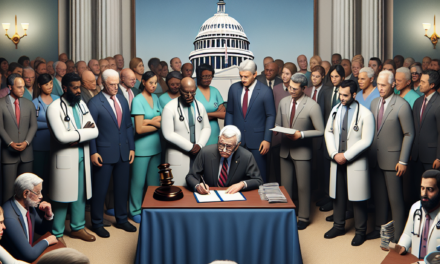Sanofi Takes Legal Action Against HHS Over 340B Rebate Policy
The pharmaceutical industry is no stranger to legal battles, especially when it comes to government policies that affect pricing and access to medications. One of the most significant recent developments in this arena is Sanofi’s legal action against the U.S. Department of Health and Human Services (HHS) regarding the 340B Drug Pricing Program. This article delves into the complexities of this legal dispute, the implications for the pharmaceutical industry, and the broader healthcare landscape.
Understanding the 340B Drug Pricing Program
The 340B Drug Pricing Program was established in 1992 as a federal program that requires drug manufacturers to provide outpatient drugs to eligible healthcare organizations at significantly reduced prices. The program aims to help safety-net providers, such as community health centers and hospitals serving low-income patients, to stretch their resources and provide more comprehensive care.
Key features of the 340B program include:
- Eligibility: Hospitals and clinics that serve a disproportionate share of low-income patients can enroll in the program.
- Discounts: Drug manufacturers must provide discounts of up to 50% or more on outpatient drugs.
- Reinvestment: Savings from the program are intended to be reinvested into patient care services.
Despite its noble intentions, the 340B program has faced criticism and scrutiny over the years. Critics argue that some hospitals and health systems have exploited the program to generate profits rather than reinvesting in patient care. This has led to calls for reform and increased oversight of the program.
The Legal Dispute: Sanofi vs. HHS
In early 2023, Sanofi announced its decision to take legal action against HHS, challenging the agency’s interpretation of the 340B program’s rebate policy. The crux of the dispute lies in how the HHS has implemented the program and the financial implications for pharmaceutical companies.
Sanofi’s legal action is primarily focused on the following issues:
- Rebate Calculations: Sanofi argues that the HHS’s methodology for calculating rebates under the 340B program is flawed and unfairly burdensome.
- Impact on Innovation: The company contends that the current rebate policy undermines its ability to invest in research and development for new drugs.
- Compliance Costs: Sanofi claims that the administrative costs associated with complying with the 340B program have escalated significantly, impacting its bottom line.
Sanofi’s legal team has emphasized that the company’s commitment to providing affordable medications is unwavering, but the current structure of the 340B program poses challenges that could ultimately harm patients by stifling innovation and access to new therapies.
The Implications for the Pharmaceutical Industry
The outcome of Sanofi’s legal action against HHS could have far-reaching implications for the pharmaceutical industry as a whole. If the court sides with Sanofi, it could set a precedent that alters how the 340B program is administered and how drug manufacturers interact with government policies.
Some potential implications include:
- Changes to Rebate Policies: A ruling in favor of Sanofi could lead to a reevaluation of how rebates are calculated and implemented, potentially resulting in more favorable terms for pharmaceutical companies.
- Impact on Drug Pricing: If manufacturers are able to reduce their rebate obligations, it could lead to higher drug prices for consumers and healthcare providers.
- Increased Scrutiny of the 340B Program: A legal victory for Sanofi may prompt lawmakers and regulators to take a closer look at the 340B program, potentially leading to reforms aimed at increasing transparency and accountability.
Moreover, the case highlights the ongoing tension between pharmaceutical companies and government agencies over drug pricing and access. As the healthcare landscape continues to evolve, it is likely that similar legal disputes will arise, further complicating the relationship between drug manufacturers and regulators.
Case Studies: Other Pharmaceutical Companies and 340B Challenges
Sanofi is not the only pharmaceutical company to face challenges related to the 340B program. Several other companies have also taken legal action or expressed concerns about the program’s impact on their operations. Examining these case studies provides valuable insights into the broader implications of the 340B program.
One notable example is the case of Eli Lilly, which has also raised concerns about the 340B program’s impact on its pricing strategies. In 2021, Eli Lilly filed a lawsuit against the HHS, arguing that the agency’s interpretation of the 340B program was overly broad and resulted in significant financial losses for the company. The lawsuit highlighted the complexities of navigating the 340B program and the challenges faced by pharmaceutical companies in maintaining profitability while adhering to government regulations.
Another example is AstraZeneca, which has publicly criticized the 340B program for its lack of transparency and accountability. The company has argued that the program has led to significant revenue losses and has called for reforms to ensure that savings are directed toward patient care rather than profit generation.
These case studies illustrate a growing trend among pharmaceutical companies to challenge the 340B program and seek legal recourse to protect their interests. As more companies join the fray, it is likely that the legal landscape surrounding the 340B program will continue to evolve, leading to potential changes in policy and regulation.
The Future of the 340B Program and Healthcare Access
The future of the 340B Drug Pricing Program remains uncertain as legal battles unfold and stakeholders continue to voice their concerns. The program has been a critical lifeline for many safety-net providers, enabling them to offer essential services to underserved populations. However, the ongoing disputes highlight the need for a balanced approach that addresses the needs of both pharmaceutical companies and healthcare providers.
Several key factors will shape the future of the 340B program:
- Legislative Reforms: Lawmakers may seek to introduce reforms aimed at increasing transparency and accountability within the 340B program, ensuring that savings are directed toward patient care.
- Regulatory Changes: The HHS may revise its policies and guidelines related to the 340B program in response to legal challenges and stakeholder feedback.
- Industry Collaboration: Pharmaceutical companies and healthcare providers may need to engage in collaborative efforts to find common ground and develop solutions that benefit all parties involved.
Ultimately, the future of the 340B program will depend on the ability of stakeholders to navigate the complex landscape of healthcare policy and find solutions that prioritize patient access to affordable medications while ensuring the sustainability of the pharmaceutical industry.
Conclusion: Key Takeaways
Sanofi’s legal action against HHS over the 340B rebate policy underscores the ongoing tensions between pharmaceutical companies and government agencies regarding drug pricing and access. As the case unfolds, it has the potential to reshape the landscape of the 340B program and influence future policies affecting the pharmaceutical industry.
Key takeaways from this article include:
- The 340B Drug Pricing Program plays a crucial role in providing affordable medications to underserved populations, but it faces criticism and calls for reform.
- Sanofi’s legal action highlights the challenges pharmaceutical companies face in navigating the complexities of the 340B program and its impact on innovation and compliance costs.
- The outcome of this legal dispute could have significant implications for the pharmaceutical industry, including potential changes to rebate policies and increased scrutiny of the 340B program.
- Other pharmaceutical companies, such as Eli Lilly and AstraZeneca, have also raised concerns about the 340B program, indicating a broader trend of legal challenges within the industry.
- The future of the 340B program will depend on legislative reforms, regulatory changes, and collaboration between stakeholders to ensure that patient access to affordable medications is prioritized.
As the healthcare landscape continues to evolve, it is essential for all stakeholders to engage in constructive dialogue and work toward solutions that benefit patients, healthcare providers, and the pharmaceutical industry alike.





